← Go Back to the Impact Challenge Table of Contents
This week’s challenge is devoted to making an impact in an indirect way: staying on top of things – both the work of your colleagues and all the most relevant new work in your field. Staying on the cutting edge of your discipline can help you find unexpected opportunities for collaboration and spark your own creativity.
This week you’ll learn how discover your colleagues’ new publications and more. We’re also going to be setting up alerts for subject areas. These alerts will send the newest research into your inbox, with very little effort on your part. We’ll cover this in even more detail later in the chapter Learn Social Media Automation for Academics.
You can use the same social networking platforms you’ve already signed up for to track the new work of your colleagues in your email inbox, and – if you’re not interested in receiving even more email than you already do – we’ll provide a tip about how to manage these alerts.
Get high quality updates by using Discover! (part of the OU Libraries Catalog)
Open the OU Libraries Discover! page and select the “Sign in” link in the upper right. Log in with your OU 4x4 and password 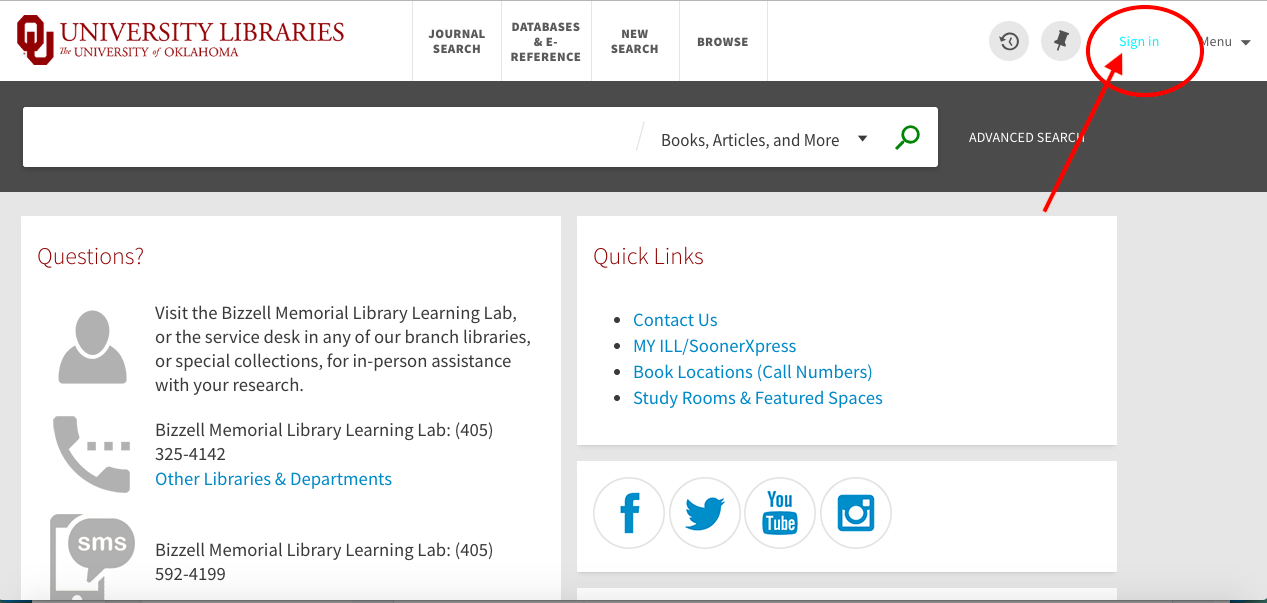
Conduct the search of your choice using either the Simple Search or the Advanced Search. Then use the facets down the left to refine your results until you have a result set you want.
Next choose “Save query” at the top your results list. A yellow banner will appear at the top of the screen, telling you the query has been saved to your “Favorites,” and giving you the option to “Turn on notification for this query.”
You can conduct several different searches and save them each individually using this same method.
If you already have items in your “Favorites,” you can also set up notifications for these saved searches too. Access your “Favorites” by selecting the large stick pin icon in the upper right hand corner of the screen. Go to the “Saved Searches” column, and use the icons next to the appropriate query. 
If you select the “notifications” option, you will receive an email anytime new material is available for your saved query. You have the option to change the email address when you set up the notification. You can stop notifications at any time by selecting the icon again to clear it.
It is also possible to set up alerts like this in most academic research databases. Directions should be available in the database’s “Help” menu, or contact your liaison librarian.
Get updates from Google Scholar
To get email updates when a colleague adds a new work, first search for them in Google Scholar (covered in Chapter 2 of the OU Impact Challenge). Next, select their profile from among the search results. On their profile page, click the Follow button, input your email address, select the alerts you want to receive, and then click “Done.” 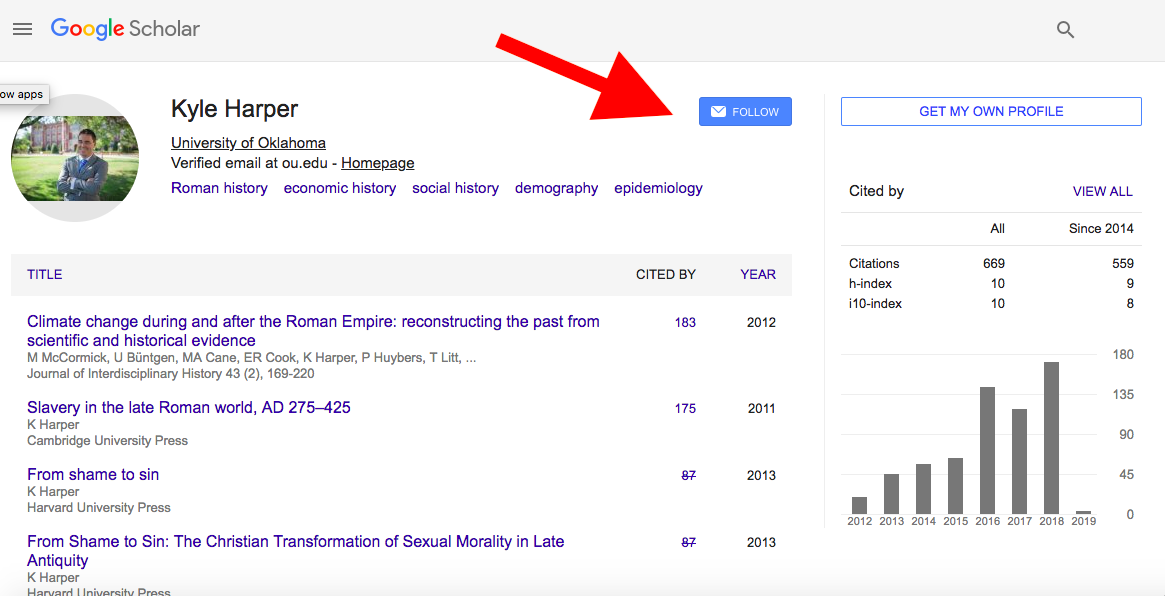
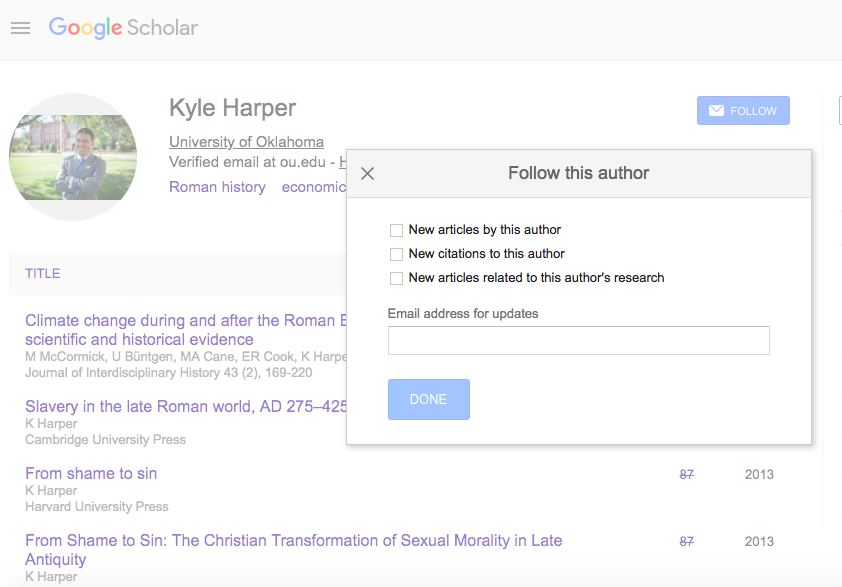
Google Scholar recommends specific papers for you based on your publication history and your “Library” of saved papers by other authors. Over time, as you save more papers to your personal library and add more of your papers to your Google Scholar profile, Google’s recommendations get more accurate.
From the Google Scholar homepage, click the “My Library” link at the top:  Then click on the bell icon at the far right underneath your profile picture:
Then click on the bell icon at the far right underneath your profile picture: 
This takes you to a list of recommended articles (remember, these will get better over time). Click the star icon beneath any entry you’d like to have added to your “My Library” to remember and read later. You can also perform this action from any Google Scholar search. “Starring” an entry will add it to your “My Library.”
Now, each time you login to Google Scholar, you’ll have a customized reading list waiting for you.
To have new recommended articles emailed to you, go to your Google Scholar Profile page, and click on the “Follow” button (yes, as if you are following yourself). Select the “Recommended articles” check box, and enter your email address. While you’re here, you’ll also want to set up alerts for other papers that cite your work, because these papers will almost always be relevant to your interests. 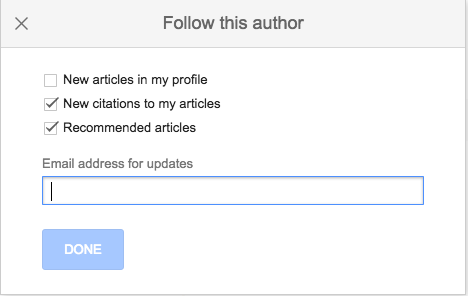
You can also set up general topical alerts: perform a search for articles (the more specific the better – for example search for “selectins” rather than “cell biology”), and then click the “Create alert” link (with the envelope icon) on the left side of the screen and fill in the form. Any time Google Scholar finds a new article that matches your search, it will send you an email alert.
Get updates from Twitter
Twitter (covered in Chapter 3 of the OU Impact Challenge) is a fantastic and solid real-time recommendation engine for publications, articles, and news related to your research interests. To get the best recommendations, you’ll need to follow individuals who tend to tweet about the subjects you’re interested in, and you’ll also need to follow curated lists of related accounts.
To find people who are tweeting content related to your discipline, use Twitter’s advanced search to search for relevant phrases. You’ll want to use many of the advanced search features and filters to get high quality results.
On the results page, click “People” from the menu bar under your search to narrow the results to Twitter users who match your interest.
We’ve searched for the term “evolution” and narrowed the results to include Twitter users who match that term: 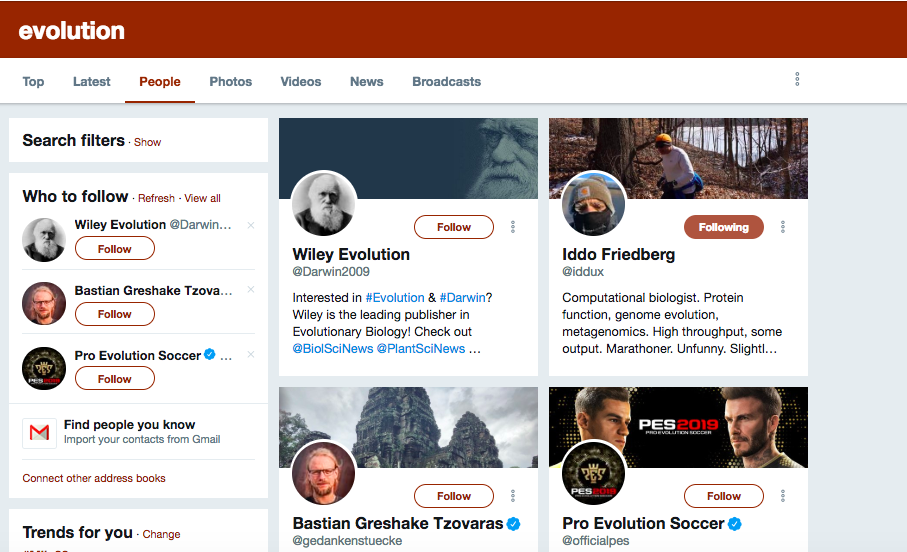
Read through the search results, keeping an eye out for familiar names and interesting bios. When you find a user from whom you want updates, click the “Follow” button in their bio. When you’re on your homepage you’ll see their recent updates.
To find lists related to your search terms, you’ll need to click on users profiles. When viewing someone’s profile, click on “Lists.” 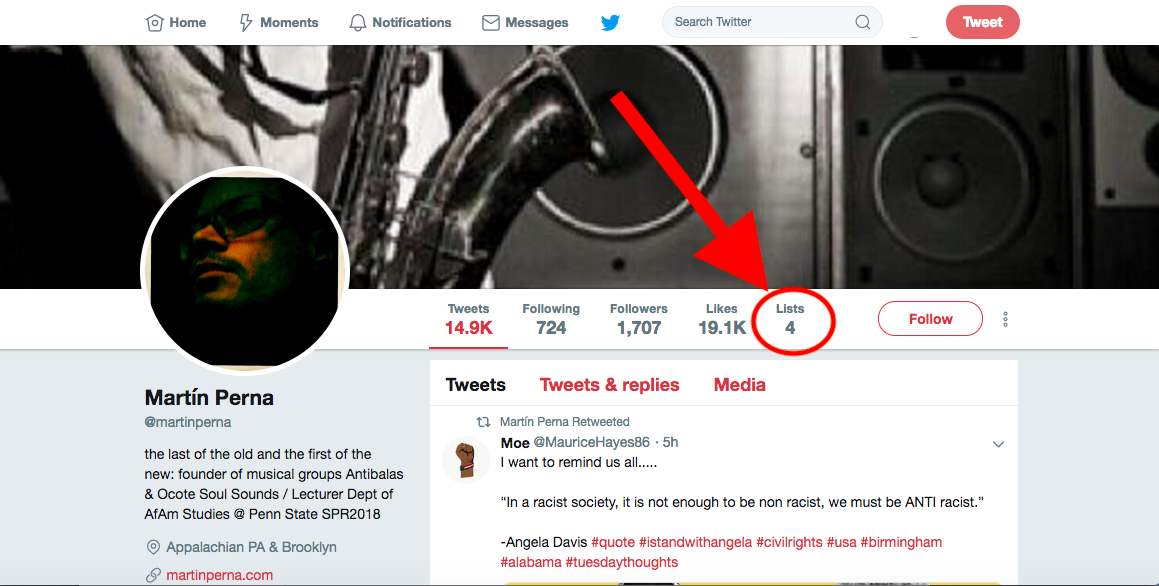
Then select a list you’d like to subscribe to. 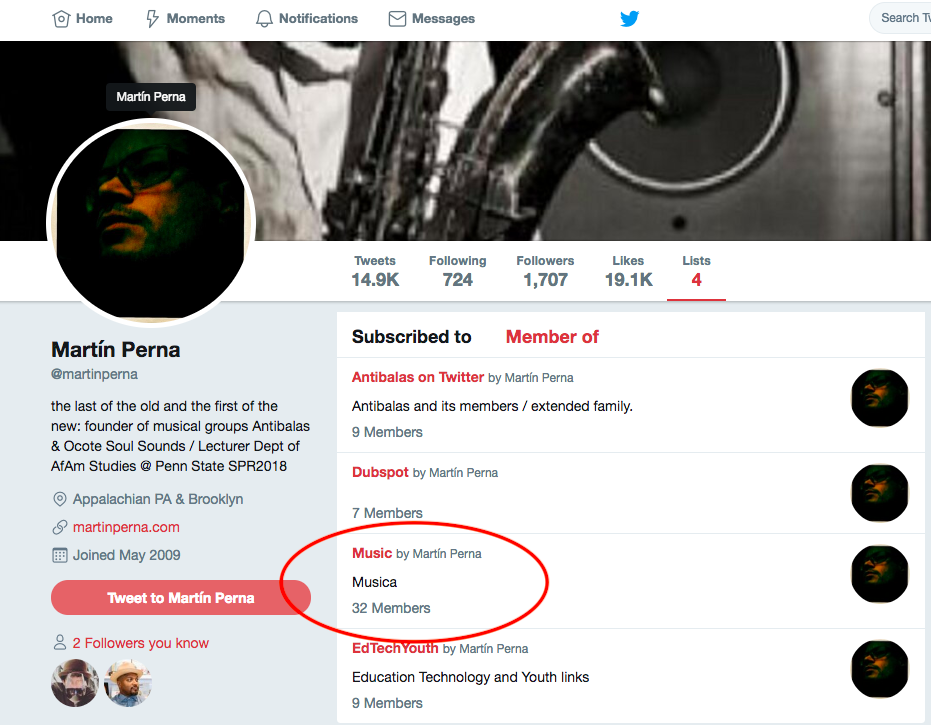
From the List page, click on “Subscribe” to follow the List. You can follow Lists without following the individual accounts in that List. 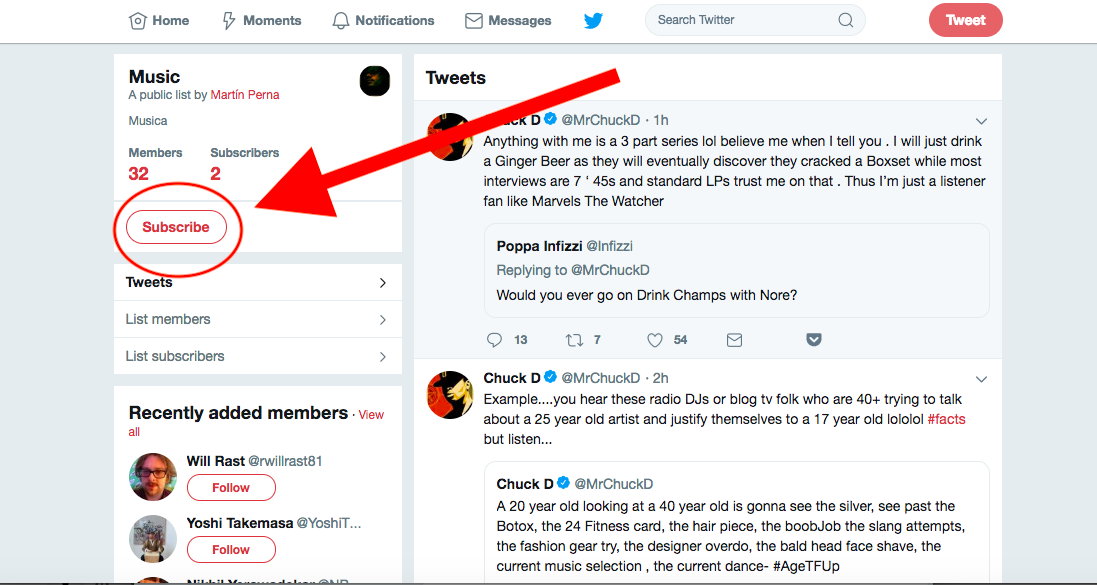
Bonus! You can also click the gray “List members” and “List subscribers” to find individual accounts to follow. Now, every time you log in to Twitter, you’ll get up-to-the-minute recommendations on recent news and papers from others in your discipline.
Something you’ll need to reconcile about Twitter is that you WILL miss anything that hasn’t been recently tweeted about, meaning you have to login fairly regularly to benefit from the recommendations on an ongoing basis. Even if you stay logged in, you’ll miss tweets. Come to terms with this soon, and you’ll have a more enjoyable experience.
Also, unlike the other approaches we discuss in this chapter, Twitter is a person-based feed, not a subject-based one. That means you may get a lot of information about what people did with their kids, along with their latest updates about their scholarship. This is a great way to help you build your research community, but it can also be overwhelming depending on your goals.
Get updates from Academia.edu
Login to Academia.edu (see Chapter 6 in the OU Impact Challenge) and search for a colleague:
On their profile, click the “Follow” button: 
Now you’ll see their most recent updates in your homepage news feed whenever you log in to Academia.edu.
To stay up to date via email – so you don’t have to log in to Academia.edu as often – you’ll need to update your email notifications settings. In the upper right hand corner of your screen, hover over your profile icon, then navigate to Account Settings > Email Notifications. Under the Papers section, select “Someone you are following adds a work” and click “Save” at the bottom of the screen.
Next, search for a subject area in the top search bar. As you begin typing, you’ll notice suggestions populating the short-form search results. When the subject you’re interested in appears, click on it to head to the subject page. On the subject page, click the green “Follow” button on the right-hand side of the screen.
A number of similar “Research Interests” will be suggested to you on this screen, too. Use this list for an easy way to find other subject areas worth getting updates for, too.
Next, you’ll need to make sure you have emails enabled for these alerts. Head back over to Account Settings > Email Notifications. Under the “Papers” section, select “There are new top papers from your News Feed.”
Get updates from ResearchGate
ResearchGate (see Chapter 6 of the OU Impact Challenge) works similarly the Academia.edu. Search for a colleague and select their profile. On their profile page, click the “Follow” button: 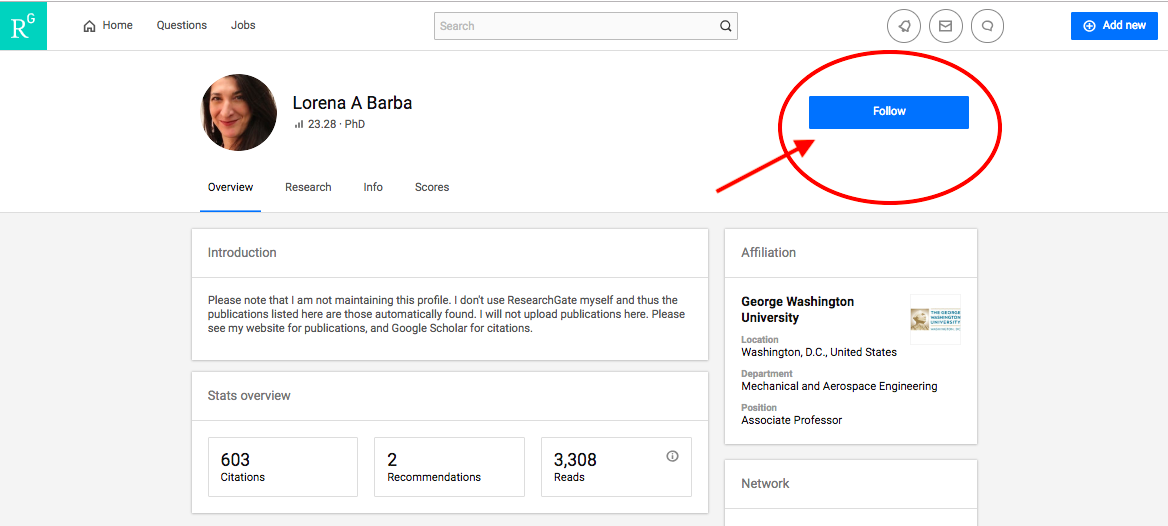
Adjust your email settings by clicking the arrow next to your picture in the upper right-hand corner and navigating to Settings > Notifications. Under the Network section, select “Adds research to their profile.”
Both ResearchGate and Academia.edu have a few drawbacks to them: they only work when your colleague adds an article to their profile themselves, so it won’t be a complete record of their recent publication history. And when you initially follow your colleague, they’ll get a notification – which could be uncomfortable in some contexts.
Remember, that ResearchGate and Academia.edu have both prompted some complaints about the volume of email they send. Like other social networks (LinkedIn is a particularly noteworthy example), they are trying to get you engaged with their site as often as possible, which can result in more inbox chatter than you’d like.
However, emails targeted at your specific interests can be quite useful. The nice thing is that both services make it pretty easy to disable the alerts if they become too noisy, so you can try it and see for yourself without much risk.
Get updates from Mendeley
You can use Mendeley Groups to stay up-to-date on publications posted to groups. These are often a peer-filtered recommendation that help you find articles you wouldn’t otherwise discover.
Login to Mendeley (covered in Chapter 7 of the OU Impact Challenge). Select “Search” in the upper right navigation bar, and then select “Groups.” Type your research interest into the search box. A list of related groups will appear in your search results. On the group page that’s most relevant to you, click the “Join” button to start receiving updates: 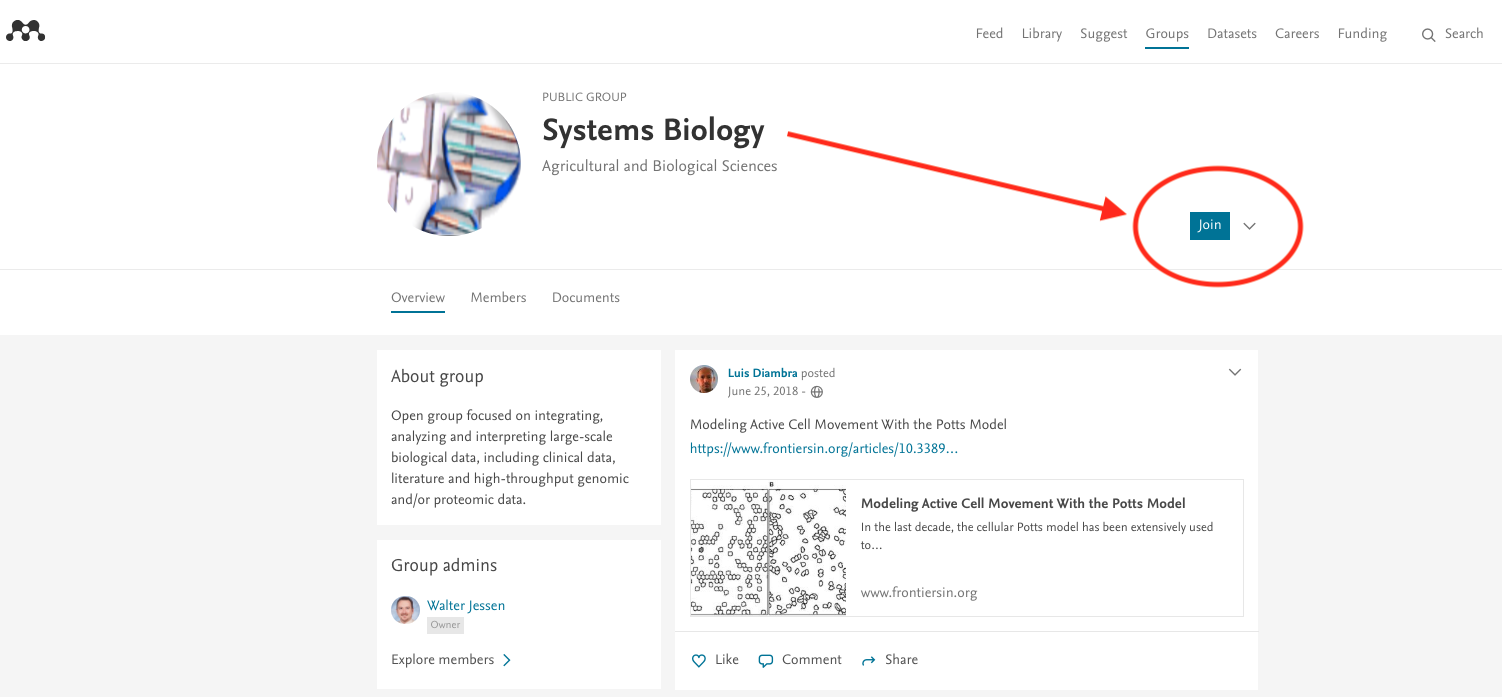
Now, every time you login to Mendeley, updates from your groups–including recommended papers–will appear in your newsfeed.
The final step is to set up email notifications, so you don’t have to return to Mendeley to get updates on new recommendations. Click the down arrow next to your profile photo in the upper-right corner of the screen, and choose “Settings & Privacy,” and then choose “Notifications.” Check the boxes labeled “Suggestions of articles to read (weekly)” and “Digest of feed activity (weekly).”
Get updates from Zotero
Zotero (covered in Chapter 7 of the OU Impact Challenge) works similarly to Mendeley. To search for groups in your discipline, login and select the Groups tab from the Zotero homepage. Search for a group, select a group page, and click the red “Join” button on the group’s page.
To get notifications from Zotero when new publications are added to a group, click the Settings link in the upper-right corner, navigate to the “Email” tab underneath the “Zotero Settings” heading, and then select “new post in group discussion” and click “Update settings.”
Probably don’t get updates from Slideshare
It’s possible to get updates when a colleague adds new presentations to Slideshare (covered in Chapter 15 of the OU Impact Challenge), but at the time of this writing the functionality is questionable, at best. If you’d still like to try, here’s what you’ll need to do:
- Search for your colleague, and select their profile (this is where Slideshare’s functionality suffered. Searching brought up, primarily, spam results).
- On their profile homepage or from the start page of any of their slide decks, click “Follow.”
- Slideshare apparently no longer allows you to update your email preferences so that you receive an email whenever someone you follow adds a new presentation. Instead, all new content they upload will be displayed on the SlideShare homepage under Trending in Your Network, plus Slideshare will automatically send you a daily digest
Because of this limited functionality, we don’t particularly recommend using Slideshare to keep up with your colleagues’ work.
Limitations
In addition to the limitations of Slideshare, there are a few other considerations with this approach. Nearly all of these options for tracking your colleagues’ scholarship only work if they – and you – have claimed a profile on the sites we’ve covered. And many people are less than enthusiastic about claiming their profiles on Academia.edu and ResearchGate, due to what some scholars have called their “spammy” emailing practices and co-opting public scholarship for private good.
Another potential limitation: you’re going to get a lot of emails with this method of tracking your colleagues. To get around these notifications clogging your inbox, we highly recommend setting up inbox filters to push these emails to a dedicated “Notifications” folder in your email. Here’s how to set up notifications for Gmail and Outlook.
Homework
- On your preferred social networks, sign up to receive disciplinary recommendations and recent publications in your inbox for at least three topics.
- Find and follow five of your colleagues and “competitors” (don’t we all have an arch nemesis?) on as many of the above sites as you can.
- Make a note to participate in the OU Impact Challenge chapter “Learn Social Media Automation for Academics on March 25” where your efforts will be automated and enhanced even more.
Content for the OU Impact Challenge has been derived from “The 30-Day Impact Challenge” by Stacy Konkiel © ImpactStory and used here under a CC BY 4.0 International License.
The OU Impact Challenge is licensed CC BY 4.0, unless otherwise noted.